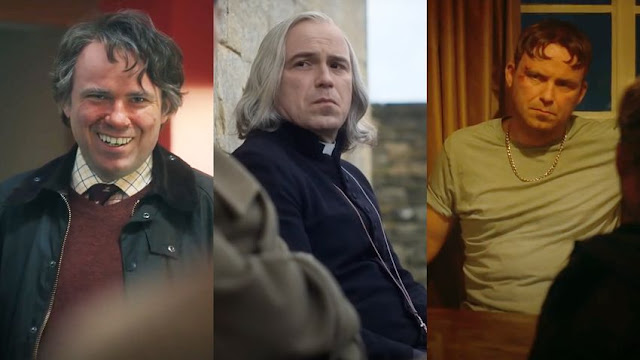Are they really all the same???
And what is truly being implied by the title here? It is one of those films that either confuses you or makes you delve really deep into the story. Nothing can be more abstract than the dramatic scenario involving Harper Marlowe, whose husband James, had recently committed suicide, leaving her in a pool of guilt, regret, and doubt. His suicide was so heinous, being that he offed himself from the upstairs balcony, causing him to be impaled by a fence, that Harper is plagued by nightmares which leads to a horrific subsequent chain of events.
Harper moves to the beautiful countryside, hoping to find peace inside her own mind. There she meets Geoffrey, the owner of the house she is renting. Her introductory meeting with Geoffrey then leads to more peculiar introductions to different "men". She finds a naked man stalking her whom she has arrested. Then she meets a young boy and a vicar who bear an eerie resemblance to Geoffrey. The boy calls Harper a bitch after she turns down the offer to play Hide and Seek with him, and the vicar implies that Harper is to blame for her husband's suicide. Basically he is siding with her husband's abusive tendencies and blaming Harper for pushing him to off himself. Right then and there, we sense that the notion is rather misogynistic and that somehow, Harper and the female species she represents are all are to blame for the cruel actions of men.
When Harper goes to the town Pub, she sees that all the customers are strictly men who also resemble Geoffrey. Geoffrey is there as well as the police officer who arrested the naked man, only informing Harper that he has been released since there were no legal grounds to keep him detained. So again, from a female's standpoint, do men in general find nothing wrong with a woman being stalked by a naked man? Why can't anything be done?
When Harper attempts to call her best friend Riley, her service is constantly being interrupted by a man's doing. She sees a policeman in her yard, but as the lights flicker, the policeman morphs into someone else, one of the patrons from the Pub. But that is not the last change. She gets chased into the house. Geoffrey comes back to the house and sees a crow who flew into the window, and breaks its' neck. The naked man finds his way again into Harper's view and she attacks him with a knife impaling his arm through the mail slot. The attack bears an uncanny resemblance to James' death where he was impaled by the fence. Another trigger point here. When the boy and the vicar make their way into the house as well, both of them appear to be severely injured. The vicar taunts Harper as he attempts to rape her, then she stabs him and leaves. Are women being blamed here for the temptations of men?
As Harper drives away, Geoffrey appears in view and gets hit by the vehicle. Him and Harper engage in a brief altercation where he ends up throwing her out of the car and chases her back to the house. As she approaches the house, the naked man once again appears. His ankle is broken, again similar to James' injuries at his death scene. The naked man then begins to give birth, which is to the young boy, who then gives birth to the vicar, then Geoffrey, and the final offspring is revealed to be James. James and Harper finally get their moment of resolution where they discuss what has happened while he continues making her feel guilty for his death. She asks James what he wants from her and he responds "your love". Can we surmise that Harper's guilty conscience was pursuing her all the way to the countryside where she tried to escape her guilt, and somehow Geoffrey, who is many men consolidated into one, is conveying a very critical message? It is in a woman's physiology to conceive and give birth, yet men conceive and give birth cognitively as it is illustrated in this movie.
In the closing scene, Riley is seen at the countryside visiting Harper. She is pregnant.



No comments:
Post a Comment